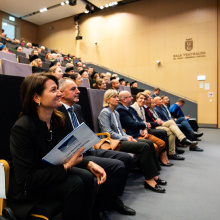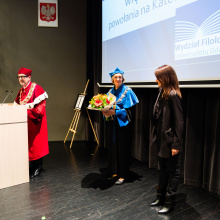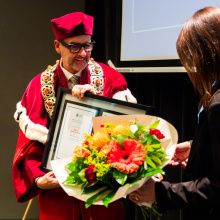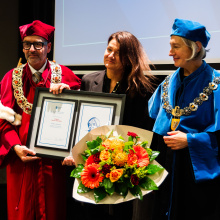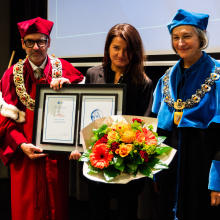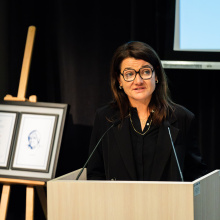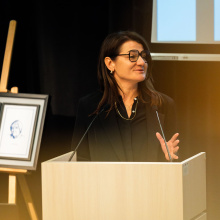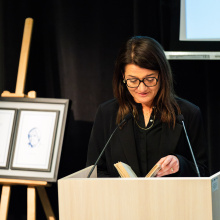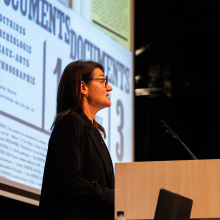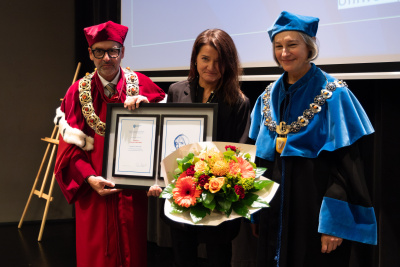
Prof. Dorota Sajewska, an outstanding theatre scholar, has taken over the Named Chair of Honour of Prof. Maria Janion at the University of Gdańsk. The ceremonial bestowal of the Chair took place after the inauguration of the academic year at the Faculty of Languages of the University of Gdańsk in a unique location: the Prof. Jerzy Limon Theatre Hall.
Prof. dr hab. Dorota Sajewska is a professor at the Institute of Theatre Studies at Ruhr-Universität Bochum in Germany. Her research interests include theories of performativity, the media and political aspects of theatre, as well as contemporary theories on performative archives and documentation of theatre and performance. She is also the author of texts on theatre, theatre scripts and translations of contemporary German plays. On 8 October, during the inauguration of the academic year at the Faculty of Languages, she took over the Prof. Maria Janion Chair at the University of Gdańsk.
‘It is a great honour and privilege for the University of Gdańsk to have such an outstanding researcher and scholar with us for the coming year,’ said the Rector of the University of Gdańsk, prof. dr hab. Piotr Stepnowski, during the ceremony. ‘I am glad that we are able to cultivate the tradition of Named Chair of Honour at the University of Gdańsk. This is not a common honorary distinction at Polish universities.’
The Rector of the University of Gdańsk recalled that the tradition of Named Chairs of Honour is very long - the first one, Lucas's Chair of Honour, was established at the University of Cambridge and was held by such scholars as Isaac Newton and Stephen Hawking. However, as prof. Stepnowski emphasised, the University of Gdańsk has its own list of distinguished scholars. Among them is Prof. Maria Janion, patron of one of the three Named Chairs of Honour at our university.
‘Professor, congratulations and please accept this symbolic token, this commemorative diploma. It weighs quite a lot,’ joked prof. Stepnowski. ‘As much as the value of this chair, because Janion is the most important to us.’
Inaugural lecture by Prof. Dorota Sajewska – ‘Transgressions (today)’
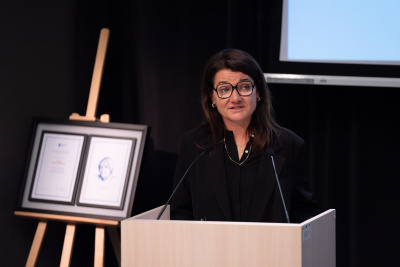
‘Nowhere else but in Gdańsk would this extraordinary honour of taking over the Maria Janion Chair have such significance in gathering my thoughts, choosing my words and formulating sentences for the topic of my lecture today “Transgressions (today),”’ said prof. Dorota Sajewska. The title of the lecture referred to the ‘Transgressions’ series (the first volume, entitled ‘Galernicy wrażliwości’ [‘Galley Slaves of Sensitivity’], was published by Wydawnictwo Morskie in 1981), comprising collections of texts, conversations, studies and commentaries resulting from seminars conducted at the University of Gdańsk by Maria Janion.
‘These seminars, initiated during a period of deepening economic and political crisis, constituted - in their emancipatory gesture of openness to contemporary philosophical and anthropological thought, literature, film, art and theatre - a true transcendence of genre and disciplinary boundaries, but also of the real boundaries existing between the Western and Eastern European worlds of culture,’ noted prof. Dorota Sajewska.
A symbolic illustration of the lecture's theme was a time-worn copy of Galernicy wrażliwości (Galley Slaves of Sensitivity) - the first volume of the Transgresje (Transgressions) series. The researcher quoted Maria Janion's words, which appear on the book's cover:
‘We gave our series a common title: Transgressions. This is because we have dealt and continue to deal with various testimonies - literary, philosophical, biographical, existential - of crossing boundaries. Transgressing oneself, transgressing norms, conventions, roles, accepted ideas of overcoming what is given and ready-made by people who wanted to go “to the other side”, to penetrate “beyond the horizon”. Previously often marginalised as harmless eccentricity, the experiences of these individuals are now increasingly treated as invaluable capital for a journey into the self, evidence of a fierce defence of the Person, and sometimes as a measure of humanistic sensitivity in a world of impersonal technical civilisation, anonymous science, environmental destruction and the alienation of individuals and communities.’
So what is transgression?
‘Transgression is possible as long as there is a boundary,’ explains prof. Dorota Sajewska. ‘It is a gesture, or rather a movement. The word transgression comes from the verb “transgredi”. ‘Trans’ means beyond, through, and “gradi” means to step, to walk, to move forward. In Polish, the word ‘kroczyć’ also reveals a consciously chosen way of walking. To walk, to step ceremoniously, with a certain performative surplus.’
In the rest of her lecture, she talked about various aspects of boundaries, their understanding, crossing, blurring and modification in the context of the changing conditions of the world, including geopolitics and culture. She quoted the thoughts of researchers such as Georges Bataille, Roland Barthes, Achille Mbembe and the literary scholar from the University of Gdańsk, prof. Stanisław Rosiek.
‘There is no doubt that in the face of changes, especially in the digital world, the discourse on transgression has become significantly more complicated. This is also because the very concept of a border has become less clear and less transparent. On the one hand, there is a reactivation of borders, tightening of state controls, an increase in the number of deportations, and the creation of closed zones. On the other hand, these same borders are undergoing constant transformation due to modern surveillance and security systems, moving into the mobile, portable and, in a sense, borderless sphere,’ noted the speaker, before quoting a passage from Achille Mbembe's Brutalism: ‘The border is no longer just a demarcation line separating separate sovereign entities. As an ontological structure, it functions in and of itself, as it were, spontaneously, anonymously and impersonally, governed by its own laws. The border is increasingly the most appropriate name for the organised violence that underlies contemporary capitalism and the order of our world in general (...). These are defiled bodies or, in other words, devastated humanity.’
An important place in today's reflections on transgression was taken by the aspect of corporeality (also in art), which ‘dissolved into new technologies’. In this part, prof. Dorota Sajewska referred, among others, to the observations of Georges Didi-Huberman, as well as to the works of Berlinde de Bruycknere (City of Refuge I, 2023), Tejal Shah (Between the Waves 2012), Marta Ziółek (Larva, 2021; Ring of Fire, 2023) and Julia Ducournau (Titane, 2021).
‘Physical matter has become inhuman or not only human: human but not only, as Marisol de la Cadena suggests,’ said the researcher.
At the end of her speech, the professor talked about the tasks of the Prof. Maria Janion Chair in the coming academic year. She referred to her own personal experiences of transgression, to the ‘identity confusion’ resulting from emigration.
‘By taking on the honorary chair of Maria Janion, I am primarily undertaking the task of continuing transgressive humanities and engaged pedagogy. As a theorist and cultural historian, I feel, on the one hand, that I am the heir to this intellectual tradition, while as a researcher and emigrant who has been outside the Polish Academy for over a decade, I feel, in a sense, indebted to Janion's maxim: To Europe, yes, but with our dead. The Polish dead undoubtedly accompany me on my travels through European universities. At the same time, with each passing year, Polish culture, the Polish language and Polish society are moving further away from me, creating a kind of opaque cultural identity within me. This opacity allows me both to preserve and to transcend Maria Janion's spiritual legacy, her project of emancipatory teaching practice and her radically conceived knowledge of humanity. Within the framework of this honourable chair, I would like to propose a reading of Maria Janion's transgressive humanities through the prism of global political challenges and the changes that have taken place in recent decades in the discourses and practices of emancipation.’
In her closing remarks, she quoted bell hooks on the role of academia and education:
‘The academy is not paradise. But learning is a place where paradise can be created. The classroom, with all its limitations, remains a location of possibility. In that field of possibility we have the opportunity to labor for freedom, to demand of ourselves and our comrades, an openness of mind and heart that allows us to face reality even as we collectively imagine ways to move beyond boundaries, to transgress. This is education as the practice of freedom.’
Prof. Dorota Sajewska is the fourth person to hold the Named Chair of Honour of Prof. Maria Janion. Previously, the chair was held by: dr hab. Agata Bielik-Robson, prof. IFiS PAN (in 2022/2023), prof. Mariusz Ziółkowski (in 2023/2024) and prof. dr Emilia Jamroziak (in 2024/2025).
More about Named Chair of Honour at the University of Gdańsk

